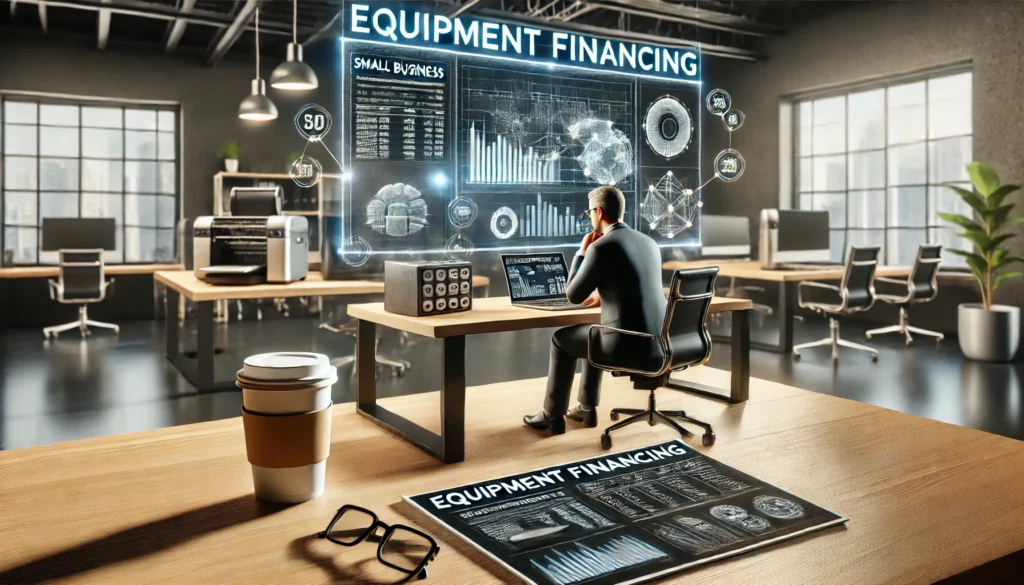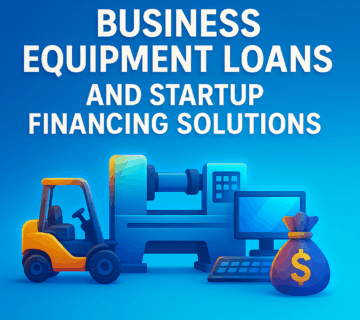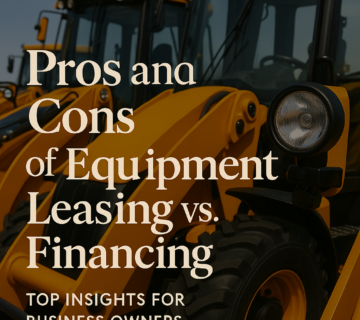Signs Your Business Needs Equipment Financing Now

Every successful business reaches a point where upgrading, replacing, or purchasing equipment becomes critical to operations. Equipment financing provides businesses with the necessary funding to acquire the tools, machinery, or technology they need without making a significant upfront investment. It allows you to preserve cash flow, increase operational efficiency, and stay competitive in your industry.
This article dives into what equipment financing entails, the signs that indicate your business might need it, and explores key concepts like equipment loans for small businesses, the role of equipment finance companies, and how heavy equipment financing can transform your operations.
What Is Equipment Financing?
Equipment financing is a loan or lease specifically designed for acquiring equipment. Unlike general business loans, equipment financing is tailored to cover the cost of machinery, technology, vehicles, or tools. The equipment itself often acts as collateral for the loan, which means the lender has less risk, resulting in more favorable terms for the borrower.
Key Characteristics of Equipment Financing
- Targeted Use: Funds are specifically for purchasing or leasing equipment.
- Preserves Capital: Allows businesses to avoid upfront payments and allocate cash for other needs.
- Repayment Structure: Typically involves monthly payments spread across a period that matches the equipment’s useful life.
Types of Equipment Financing
- Loans: You own the equipment once the loan is repaid. This option is ideal for long-term use.
- Leases: You pay for the use of the equipment without owning it, often suitable for short-term or rapidly evolving industries.
Equipment finance companies specialize in offering these solutions, streamlining the process for small businesses.
Signs Your Business Needs Equipment Financing Now
1. Frequent Downtime Due to Outdated Equipment
Outdated equipment is prone to breakdowns, leading to production delays and increased maintenance costs. If repairs are becoming more frequent and expensive, it might be more cost-effective to replace the equipment with financing options.
2. Expansion Plans Require Advanced Machinery
As your business grows, you may need additional or more sophisticated machinery. For example, a construction firm expanding to new projects may require heavy equipment financing to purchase bulldozers or excavators. Financing provides the capital to meet expansion needs without draining your resources.
3. Rising Competition in Your Industry
Businesses must adapt to stay competitive. If your competitors are leveraging advanced tools or technology, it’s time to upgrade. An equipment finance company can help you acquire cutting-edge technology to keep pace with industry standards.
4. Increasing Customer Demand
Rising demand often requires scaling production. For instance, a bakery experiencing a surge in orders might need an industrial oven. Equipment loans for small businesses can help meet these demands without compromising cash flow.
5. Struggling to Maintain Cash Flow
Purchasing equipment outright can strain your budget. Equipment financing spreads costs over time, enabling you to maintain a healthy cash flow while accessing the resources you need.
6. New Regulatory or Industry Standards
Industries like healthcare, food service, and manufacturing frequently face regulatory updates. If compliance requires upgrading to new equipment, equipment loans for small businesses can provide the financial flexibility to meet these requirements.
7. Expired Lease Agreements
If your equipment lease is about to expire, you may need financing to renew the lease or purchase the equipment outright. Financing also provides an opportunity to upgrade to better models.
8. Launching a New Product or Service
New offerings often require specialized tools or machinery. For instance, a printing business adding a new product line might need advanced printing machines. Financing ensures you have the resources to meet the demands of innovation.
9. High Repair Costs for Current Equipment
When maintenance costs exceed the equipment’s value, it’s time for a replacement. Financing allows you to invest in newer, reliable models that reduce downtime and operational inefficiencies.
10. Limited Access to Traditional Loans
Small businesses may struggle to qualify for traditional loans due to limited credit history or insufficient collateral. Many equipment finance companies offer tailored solutions, making it easier to secure the necessary funding.
11. Seasonal Business Requirements
Seasonal businesses often require equipment for a specific period. For example, a landscaping business might need lawnmowers for the spring and summer seasons. Heavy equipment financing or leasing offers a cost-effective solution for such temporary needs.
12. Lack of Technological Upgrades
Using outdated technology can slow your operations and decrease productivity. Upgrading through equipment financing ensures you stay ahead in your industry while spreading the cost over time.
13. Business Relocation or Expansion
Moving to a larger space or opening a new location often requires additional equipment. Financing ensures your new space is fully equipped without overextending your budget.
14. Need for Tax Benefits
Equipment financing often provides tax advantages. Businesses may deduct the interest paid on the loan or benefit from depreciation deductions, reducing their overall tax liability.
15. Growing Employee Workforce
As your team expands, so does the need for equipment like desks, computers, and specialized tools. Equipment financing helps you meet these growing demands efficiently.
The Role of Equipment Finance Companies
Equipment finance companies play a crucial role in making financing accessible for small businesses. These specialized lenders understand the unique challenges of acquiring equipment and offer tailored solutions, including:
- Flexible repayment terms
- Competitive interest rates
- Industry-specific financing options (e.g., heavy equipment financing)
Such companies streamline the application process, often requiring minimal documentation and providing quick approval timelines.
Benefits of Equipment Financing
1. Preserves Cash Flow
Financing spreads costs over manageable payments, ensuring your business retains liquidity for other operations.
2. Access to Advanced Technology
Upgrading to the latest equipment improves efficiency and keeps you competitive.
3. Tax Benefits
Many equipment financing agreements offer tax deductions on interest payments or depreciation.
4. Flexible Payment Options
Lenders offer plans tailored to your budget and business cycles, ensuring you can repay comfortably.
5. Improved Productivity
New equipment reduces downtime, enhances productivity, and lowers long-term costs.
How to Secure Equipment Financing
1. Assess Your Needs
Identify the specific equipment you require and how it will contribute to your business’s success.
2. Evaluate Financial Health
Understand your budget, cash flow, and credit score to determine what financing options are feasible.
3. Research Lenders
Look for reputable equipment finance companies with experience in your industry. Compare interest rates, repayment terms, and loan amounts.
4. Prepare Documentation
Gather financial records, tax returns, and a business plan to streamline the application process.
5. Negotiate Terms
Work with your lender to secure favorable terms, such as lower interest rates or extended repayment periods.
FAQs on Equipment Financing
1. What is equipment financing?
Equipment financing is a loan or lease used to purchase machinery, tools, or technology essential for business operations.
2. How does equipment financing differ from traditional loans?
Equipment financing is designed specifically for equipment purchases and often uses the equipment as collateral.
3. Can startups access equipment financing?
Yes, many equipment finance companies offer financing options for startups, although terms may vary based on creditworthiness.
4. Is leasing better than purchasing equipment?
Leasing is ideal for short-term needs, while purchasing is better for long-term ownership.
5. Can I finance heavy equipment?
Yes, heavy equipment financing is tailored for acquiring large machinery like excavators, bulldozers, or forklifts.
6. How quickly can I secure equipment financing?
The process typically takes a few days to a few weeks, depending on the lender and the complexity of the application.
Conclusion
Recognizing the signs that your business needs equipment financing is essential for staying competitive and efficient. Whether you’re replacing outdated machinery, meeting increased demand, or expanding your operations, equipment loans for small businesses and heavy equipment financing offer practical solutions. With the support of a reliable equipment finance company, you can acquire the tools necessary to drive your business forward.




No comment